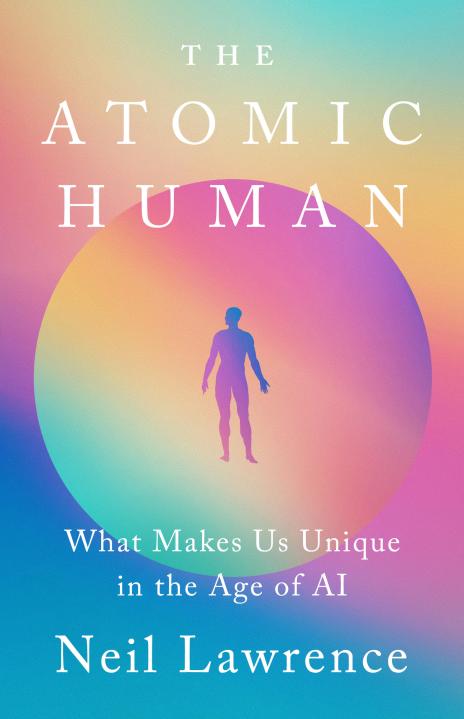The Sorcerer’s Apprentice in the Age of AI: Reflections from Neil D. Lawrence’s Epilogue in The Atomic Human
by John Fisher
In the rapidly evolving digital era, the intersection of artificial intelligence (AI) and societal values has become a defining issue of our time. In the epilogue of The Atomic Human, Neil D. Lawrence offers a profound exploration of this dynamic, drawing parallels between historical insights and contemporary challenges. Through his analysis, he underscores the urgent need for democratic societies to balance innovation with accountability, ensuring that technological advancements support—not undermine—the values of freedom, diversity, and collective agency.
Technology and the Open Society
Lawrence frames his reflections with two striking references: Disney’s Fantasia and Karl Popper’s The Open Society and Its Enemies. The iconic image of the sorcerer’s apprentice, whose overconfidence unleashes uncontrollable chaos, serves as a metaphor for the unintended consequences of AI and other powerful technologies. Lawrence argues that today’s tech leaders, much like the apprentice, have unleashed innovations they cannot fully control.
Popper’s philosophy, developed in the shadow of World War II, offers a compelling framework for understanding these challenges. He championed the principles of an “open society”—a flexible, democratic system built on collaboration, adaptability, and shared values. Popper warned against the dangers of centralized power and unchecked authority, advocating instead for societies guided by accountable institutions and practical problem-solving.
Big Tech and the Sorcerer’s Spell
Bringing Popper’s ideas into the 21st century, Lawrence critiques the role of big tech companies in reshaping the “open society.” He highlights the disruptive practices of social media platforms, particularly Facebook, whose ethos of “move fast and break things” epitomized a trial-and-error approach to innovation. This recklessness, Lawrence contends, has undermined societal institutions and eroded democratic safeguards.
One of his most vivid examples is Mark Zuckerberg’s 2019 plea for regulation, where the tech mogul acknowledged that Facebook’s influence had grown beyond his control. Lawrence likens this to the apprentice’s frantic attempt to stop the flood of consequences, emphasizing the need for greater foresight and responsibility in technological development.
The Perils of AI and Information Totalitarianism
Lawrence’s critique extends to the rise of AI, particularly generative systems like ChatGPT. He questions the vision of AI as a societal panacea, drawing unsettling parallels between this idealism and historical ideologies such as eugenics. These movements, often driven by the ambitions of “great men,” sought to engineer society in ways that ultimately led to oppression and totalitarianism.
In today’s context, Lawrence warns of “information totalitarianism,” where the monopolization of information flows by tech giants threatens democratic integrity. By controlling the channels through which people access knowledge and shape public discourse, these corporations risk creating an imbalance that privileges their interests over societal well-being.
Reclaiming the Open Society
Despite the bleak prospects, Lawrence offers a roadmap for reclaiming democratic agency in the face of technological dominance. He calls for a revival of Popper’s principles, urging governments, civic institutions, and communities to reassert their authority over the digital realm. Through collaboration, regulation, and a shared commitment to accountability, society can mitigate the risks posed by unchecked innovation.
This collective effort, Lawrence argues, is essential to preserving the values of the open society—freedom, pluralism, and adaptability—in an age of rapid technological change. He emphasizes that the future of democracy hinges on our ability to balance innovation with oversight, ensuring that technological progress serves humanity rather than dominating it.
Conclusion
Neil D. Lawrence’s epilogue in The Atomic Human offers both a cautionary tale and a call to action. By drawing on historical insights and contemporary examples, he illuminates the profound challenges posed by AI and big tech to democratic societies. Yet his vision is not one of despair but of possibility. Through renewed commitment to the principles of the open society, we can navigate the complexities of technological advancement, ensuring a future where innovation and accountability coexist to uphold the values that define us.
Discussion Points for Reflection
- How does the metaphor of the sorcerer’s apprentice enhance our understanding of the unintended consequences of AI?
- What steps can governments, civic institutions, and individuals take to counterbalance the influence of tech giants?
- How might society prevent the monopolization of information and protect democratic discourse?
- Does Karl Popper’s “open society” provide an effective framework for addressing the challenges posed by AI and big tech?
By engaging with these questions, we take the first steps toward shaping a future that aligns technological progress with the enduring principles of democracy and human dignity.
Hashtags: #ArtificialIntelligence #OpenSociety #TechEthics #AIRegulation #DigitalDemocracy
This article was created with the assistance of AI.

No comments:
Post a Comment